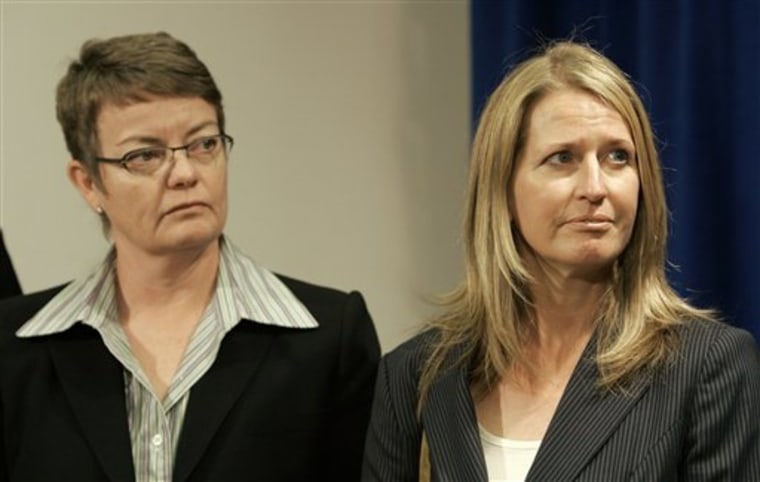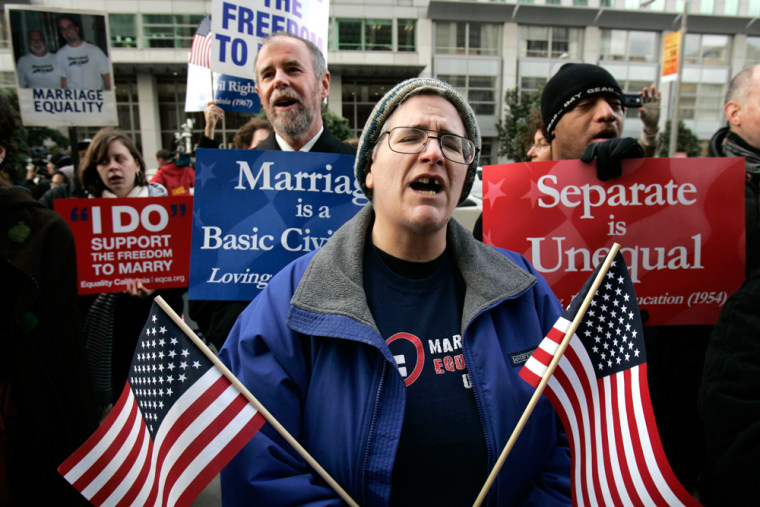Two same-sex couples gave intimate accounts of their private and public lives Monday during the opening day of a highly anticipated federal trial to decide the constitutionality of state bans on gay marriage, at times tearfully testifying about moments of awkwardness, disappointment and shame that they said resulted from their inability to legally wed.
"I've been in love with a woman for 10 years, and I don't have access to a word for it," said Kristin Perry, 45, the lead plaintiff in a lawsuit seeking to overturn the voter initiative that outlawed gay marriage in California. "You chose them over everybody else, and you want to feel that it is going to stick and that you are going to have the protection and support and inclusion that comes from letting people know you feel that way."
Perry and her partner, Sandra Stier, 47, and a gay couple from Los Angeles, Paul Katami, 37, and Jeffrey Zarrillo, 36, were the first witnesses in a case that could become a landmark that determines if gay Americans have the right to marry. Their testimony, designed to demonstrate that the law passed as Proposition 8 promotes inequality, was expected to provide the human element during proceedings that will rely heavily on evidence from academic experts.
Marriage before family
Katami, a manager for a fitness company, said he and Zarrillo "would love to have a family" but have intentionally postponed fatherhood until they can legally wed because they want their children to have the stability and sense of belonging that comes with being raised by married parents.
"The timeline for us always has been marriage first before family," Katami said. "For us, marriage is so important because it solidifies the relationship and gives us access to the relationship that is global. The struggle we have legitimizing ourselves to other people would be eradicated."
Earlier in the day, attorney Theodore Olson, who represents the two couples, quoted the U.S. Supreme Court's own lofty description of matrimony to demonstrate what his clients were being denied.
"In the words of the highest court in the land, marriage is the most important relationship in life and of fundamental importance to all individuals," said Olson, who represented George W. Bush during the Florida recount in 2000 and later served as his solicitor general.
The trial is the first in a federal court on the question of whether the U.S. Constitution's guarantee of equal treatment forbids prohibiting gays from getting married. Chief U.S. District Judge Vaughn R. Walker, who is presiding over the trial without a jury, peppered lawyers with questions during their opening statements.
The judge asked if they had evidence the Constitution grants gays the right to marry and if states have a reasonable right to deny those marriages.
Domestic partnerships
Among other things, Walker asked how Proposition 8 could be discriminatory since California already allows domestic partnerships that carry the same rights and benefits of marriage.
"If California would simply get out of the marriage business and classify everyone as a domestic partnership, would that solve the problem?" the judge asked.
Olson answered that he did not think such a move would be politically feasible.
"I suspect the people of California would not want to abandon the relationship that the proponents of Proposition 8 spent a tremendous amount of resources describing as important to people, and so important it must be reserved for opposite-sex couples," he said.

Attorney Charles Cooper, who represents Proposition 8 sponsors, said it's too difficult to know the impact of gay marriage on traditional marriage because the practice is still so new.
Only five states have opened the institution to same-sex couples, and three were required to do so by judges, he said.
"While the people of California have been steadfast in their defense of marriage, they have also been generous in their extending of the rights and benefits and protections of marriage to the gay and lesbian population," Cooper said.
He also noted that President Barack Obama doesn't support legalizing gay marriage, a remark that prompted Judge Walker to note that Obama's own parents would not have been allowed to get married in some states before the Supreme Court overturned state bans on interracial marriage in 1967.
"That indicates there is quite a change in individuals' entitlement to enter the institution" of marriage, Walker said.
Likely to be appealed
Regardless of the outcome of the case, it's likely to be appealed to the U.S. Supreme Court, where it could lead to gay marriage bans being abolished or upheld nationwide.
Two hours before the trial was scheduled to start, the Supreme Court blocked video of the proceedings from being posted on YouTube.com. It said justices need more time to review that issue, and put the order in place at least until Wednesday.
Over the weekend, Proposition 8's sponsors sought to block footage of the trial from being uploaded to the video-sharing site after Walker approved the plan last week. Walker said the case was appropriate for wide dissemination because it dealt with an issue of wide interest and importance.
Rick Jacobs, chairman of the Los Angeles-based gay rights organization the Courage Campaign, said his group was disappointed with the decision to bar cameras and called on the high court to lift its ban.
"It's time that the debate about marriage equality is seen for what it is — a debate over the rights of our friends and families to live their lives freely," he said.
At trial, Walker also intends to quiz lawyers on whether sexual orientation is something people are born with or whether it can be changed, and about the effect on children of being raised by two mothers or two fathers.
Witnesses for Proposition 8 backers will testify that governments historically have sanctioned traditional marriage as a way to promote responsible child-rearing, and that this remains a valid justification for limiting marriage to a man and a woman.
